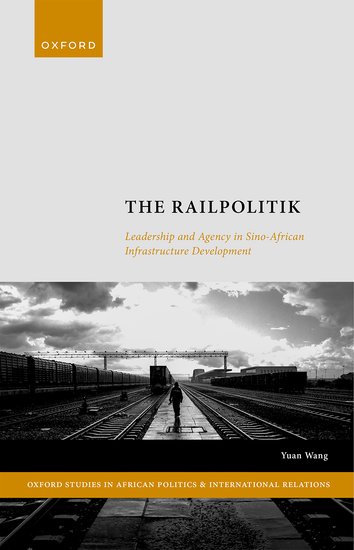By Shanshan Wu and Chi Zhang, edited by Tianlei (Ruby) Qiu

Interested in the interactions between Chinese state actors and African politics, Prof. Yuan Wang, Assistant Professor of International Relations at DKU, and one of the leads of the China and the Global South Cluster, investigates why Chinese-financed and -constructed infrastructure projects develop into starkly different trajectories in different African countries in her latest published book, titled: The Railpolitik: Leadership and Agency in Sino-African Infrastructure Development (forthcoming with Oxford University Press). Drawing from extensive research conducted in Angola, China, Ethiopia, and Kenya, Prof. Yuan Wang examines the pivotal role of African leadership agency in shaping the outcomes of Chinese-funded railway projects. Her work posits that political championship can be generated not only from centralized developmental states, but also from leaders’ perceived threats of competitive elections in democratic states. In a recent talk, we had the opportunity to engage with Professor Yuan Wang, primarily exploring the themes addressed in her book and her perspectives on research.
Q: Hi professor, thank you for talking with us. We learnt that your scholarly interests are deeply connected to African politics, as showcased in your latest book concentrating on African railway development. Could you briefly share what inspired you to choose African politics as a core area of your research?
I worked and lived in Nairobi, Kenya from 2013-14, and that experience greatly shifted my later research interest. Back then the Chinese-sponsored Kenyan standard gauge railway was in the news on a daily basis, everyone was talking about it. People perceived it as a promise of modernity, a gateway to corruption, and many things in between. So, when I need to select a research topic at Oxford, China’s infrastructure presence in Africa naturally came to my mind. I was curious how Chinese engineers – many of whom my friends, were involved in African politics through these infrastructure projects.
Q: Could you also delve further into the key points or central arguments explored in your book?

The puzzle is: why do Chinese-sponsored railways that are similar in nature, develop along starkly different trajectories in different African states? By comparing the Kenyan Standard Gauge Railway, Addis Ababa-Djibouti Railway in Ethiopia, and Angola’s Benguela railway, I show that it was African political leadership, which I call ‘political championship’, that shape how Chinese project develops. The then Kenyan president attached unprecedented commitment to the railway’s success, making the railway his campaign capital, and frequently intervene in the construction and operation to fast-track problem solution; as a result, the Kenyan railway became the first project in Kenyan history that was complete ahead of schedule. Ethiopian railway suffered from some delays, with the country’s political leadership shifting their attention from infrastructure development to maintaining stability. The Angola railway never really got leadership attention as the project was remote from the leader’s political survival, which was largely dependent on oil revenue and a network of supporters.
Q: What kind of challenges and concerns did you face while conducting your research, and how did you navigate or resolve these hurdles? Are there specific instances or examples you could share?
This book relies on over 250 interviews over 40 weeks of fieldwork in China, Angola, Ethiopia, Kenya. Fieldwork was the most exciting part of this research, but also the most challenging one. Frequently I was deeply touched by Chinese engineers/managers and African bureaucrats/civil society’s perseverance in resolving obstacles to make an imagined railway materialize. Building trust with them, however, was not easy, particularly at the beginning. I had a detailed fieldwork note as appendix in this book, which is available in both hard copy and eBook at our library, reflecting on how my identity as a Chinese, female young scholar in a Western institution affects my fieldwork and how people perceive me on the ground.
Q: Could you share some insights into your future research plans within this field? Additionally, are there any opportunities planned for students to actively participate or get involved in your research projects?
I still deeply love the topics of African politics and China-in-Africa, my focus now slightly shifts to how local people perceives Chinese-sponsored projects, and how China promote (propagate) herself to host country citizens. In other words, are these infrastructure projects effective in ‘buying hearts and minds’. Another strand of research I’m working on is how Chinese actors, after interacting with African stakeholders, learn from them and change their behaviours, particularly in the areas of ESG; and whether these changes travel back to Chinese companies’ headquarters in China, leading to broader corporate behaviour improvements.


